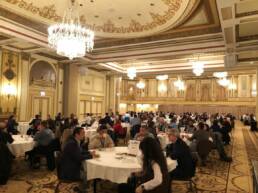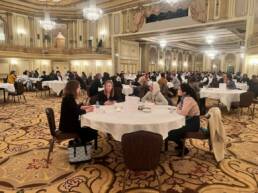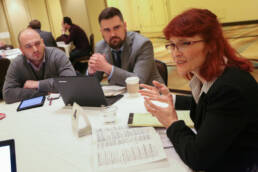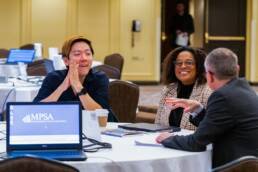MPSA 2024-2025 Academic Year Mentoring Program
The annual MPSA Mentoring Program pairs mentees of various career stages with a mentor for the duration of the academic year. If selected for the program, mentees will work remotely (via video chat or phone) with a mentor in a loosely structured format throughout the 2024-25 academic year. The total time commitment is approximately 10 hours. You must be an MPSA member to participate.
The deadline to apply for the 2024-25 Mentoring Program has passed.
Who can apply for the Mentoring Program?
MPSA members who are junior faculty, contingent faculty, postdoctoral scholars, Ph.D.s in non-academic positions, and graduate students are all encouraged to apply. There are more than 70 available mentors representing a wide variety of institutions, subfields and specialties, and career stages, including mentors who can provide guidance for non-academic career paths.
What is the timeline for those accepted to the Mentoring Program?
Around the start of the academic year (early September 2024) both parties will receive a notification containing names, contact information, and CVs. Mentees will be asked to reach out to their mentor within one week to establish contact and begin coordination of an initial meeting to establish expectations and a rough plan for how the mentoring relationship will develop over the course of the academic year.
What will the mentoring relationship look like?
Each mentoring relationship is unique, dependent upon the situation and need of the mentee and the particular experience and expertise of the mentor. At the time of the initial meeting, the MPSA will provide a template that can be used for establishing goals and a rough schedule of future meetings for the academic year. Substantively, the Mentoring Program is intended to provide career guidance and professional development as opposed to assistance with research, reviewing manuscripts, etc. Common topics of conversation for graduate student mentees include preparing for and navigating the job market, publishing journal articles, transforming a dissertation into a publishable manuscript, teaching new courses, or time management techniques and research strategies; for Ph.D.s and junior faculty, common topics include academic administration, managing university and professional service responsibilities, preparing for tenure or promotion to full professor, pedagogical techniques in the classroom, or strategies for balancing professional productivity with personal wellbeing.
Questions? Please contact MPSA Membership staff at mpsainfo@mpsanet.org.
See what previous participants have to say about the MPSA Mentoring Program:
“This is a really great program for scholars in an early academic career, especially those who lack mentoring support within their own department or school.”
“I had an amazing experience in this program! My mentor was truly caring, inspiring, and insightful. I definitely plan to stay in touch in the future, and I am grateful to the MPSA Mentoring Program for giving us the opportunity to connect.”
“In the past three years I have tried other mentoring programs, but my life changed completely when I was matched with my MPSA mentor. We truly became friends – he is kind, passionate, and helped me to manage my job market stress while guiding me along the way. I feel lucky and I believe he is one of the best mentors out there.”
“Excellent program. The mentorship agreement was helpful in setting expectations and timeframes for meetings. My mentor was extremely helpful and I am thankful for the opportunity and ongoing professional connection.”
“This was a great mentoring partnership where I found a colleague, advisor, and friend. Thank you!”
“The MPSA Mentoring Program is an excellent idea. It matched me with a scholar who has been invaluable in my academic job search, providing timely advice and useful tips.”
“This is a very valuable program. This is the second time I’ve participated and both times have been very useful for my development.”
MPSA Mentoring Reception (Small Group Mentoring) at the Annual Conference
The 2024 Mentoring Reception will be held during the 81st Annual MPSA Conference on Friday, April 5 from 6:30 – 7:30 PM at the Palmer House Hilton in Chicago, IL
(In-Person Participation Only)
The MPSA Mentoring Reception provides an opportunity for conference attendees who are graduate students, contingent faculty, junior faculty, or PhDs holding non-academic positions to meet with faculty mentors over refreshments in a small-group setting during the annual conference.
Please note, you must be registered for the in-person conference to participate; there will not be an option to participate virtually. Please review your conference schedule before you RSVP for the Mentoring Reception.
The call for mentees has closed. Notifications containing mentee names, contact information, and research questions/conversation topics will be provided to mentors in late March. Shortly after, participants in each small group will receive a message of introduction to others. There will be no onsite sign-ups for this event, so you will have plenty of time to review the information for those is your group prior to the event.




Thank You to Our 2024 Mentoring Reception Mentors:
- Hassan Afzal, University of Tennessee at Chattanooga
- Craig D. Albert, Augusta University
- Nikolay Anguelov, University of Massachusetts, Dartmouth
- Ricardo A. Bello-Gómez, Rutgers University
- Florence Bouvet, Sonoma State University
- Nate Breznau, University of Bremen
- Guy C. Charlton, University of New England Law School
- Yixin Dai, Tsinghua University
- Tijen Demirel-Pegg, Indiana University-Purdue University Indianapolis
- Giacomo DiPasquale, Wagner College
- David Foster, London School of Economics and Political Science
- Matthew J. Geras, University of Illinois Springfield
- Binda Godlove Aka, Adelphi University
- Stephen N. Goggin, San Diego State University
- Mark A. Graber, University of Maryland Carey School of Law
- Taha Hameduddin, University of Kentucky
- Yusaku Horiuchi, Dartmouth College
- Mark S. Jendrysik, University of North Dakota
- Cindy D. Kam, Vanderbilt University
- Inkyu Kang, University of Georgia
- Maxat Kassen, Astana IT University
- Carl LeVan, American University
- Cathy Yang Liu, Georgia State University
- Cristopher T. Lynch, Missouri State University
- Brian Norris, Lincoln University of Missouri
- Muhammad Iqbal Roy, Government Murray Graduate College Sialkot
- Virginia Sapiro, Boston University & University of Wisconsin-Madison
- Jim Simeone, Illinois Wesleyan University
- Mette Marie Staehr Harder, Karlstad University
- Carol Strong, University of Arkansas at Monticello
- Kim Twist, San Diego State University
2023-2024 Mentors
The MPSA is grateful for the following members who have volunteered to serve as mentors for the 2023-2024 academic year:
• Jason Anastasopoulos, University of Georgia
• Andrea Barrick, Radford University
• Michael Bednarczuk, Austin Peay State University
• Jeffrey Bernstein, Eastern Michigan University
• Michael Burch, Eckerd College
• David Dolowitz, University of Liverpool
• Elizabeth Dorssom, Lincoln University of Missouri
• Nicholas Idris Erameh, Nigerian Institute of International Affairs
• David Foster, London School of Economics & Political Science
• Sujay Ghosh, Vidyasagar University
• Beth Ginsberg, University of Connecticut
• Magda Giurcanu, National Louis University
• Stephen Goggin, San Diego State University
• Jessica Gracey, Northwest Missouri State University
• Stuart Gray, Washington and Lee University
• Tobias Heinrich, University of South Carolina
• Julia Hellwege, University of South Dakota
• Sarah James, Gonzaga University
• Faisal Javaid, Federal Urdu University, Karachi
• Chan Ka Ming, Newcastle University
• Niki Kalaf-Hughes, Bowling Green State University
• Sohaib Khaliq, Mirpur University of Science and Technology
• Mutlu Koseli, Chicago State University
• Jeffrey Kraus, Wagner College
• Kamal Kumar, University of Allahabad
• Juheon Lee, Midwestern State University
• Jan Leighley, American University
• Wei Li, Huazhong University of Science and Technology
• Kevin Lorentz, Saginaw Valley State University
• Jonathan Maiangwa, University of Maiduguri
• Bashar Malkawi, University of Arizona
• Ali Masood, Oberlin College
• Fletcher McClellan, Elizabethtown College
• Mary McGuire, SUNY Cortland
• Nathalie Mendez, Universidad de los Andes, Colombia
• Austin Mitchell, Norwegian University of Science and Technology
• Ryan Moore, American University
• Andrew Morelock, Marshall University
• Sayed Mahdi Munadi, Sciences Po Paris
• Gregg Murray, Augusta University
• Brian Norris, Lincoln University of Missouri
• Gbadebo Odularu, Howard University
• Kai Ou, Florida State University
• Matthew Placek, University of South Carolina Upstate
• Branislav Radeljic, United Arab Emirates University
• Shauna Reilly, Northern Kentucky University
• Xavier Romero Vidal, University of Cambridge
• Nalanda Roy, Georgia Southern University
• Maria Sanchez, Colorado College
• Constanza Sanhueza Petrarca, Australian National University
• Carlos Scartascini, Inter-American Development Bank
• Pamela Schaal, Ball State University
• Molly Scudder, Purdue University
• Sepehr Shahshahani, Fordham University Law School
• William Shughart, Utah State University
• Charles “Tony” Smith, University of California-Irvine
• Katie Stewart, Knox College
• Aaron Stuvland, George Fox University
• Pablo Toral, Beloit College
• Kim Twist, San Diego State University
• Matthew Wilson, University of South Carolina
• Alixandra Yanus, High Point University
• Mengqi Yuan, Tsinghua University
• Christopher Zorn, Pennsylvania State University
